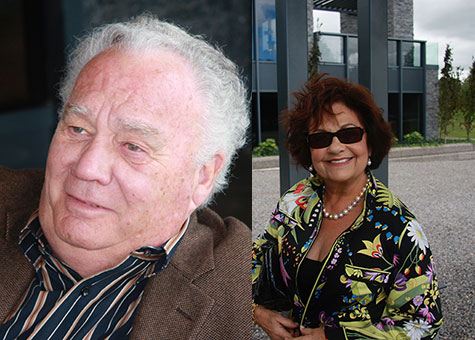
Lynda Picov has always led by example and, together with her husband Norm, talked to her family about the importance of caring for others and giving back.
She taught them well.
In honour of Lynda’s 78th birthday, The Robin and Barry Picov Family Foundation and The Picov Family have donated $250,000 to launch two high-impact projects at Baycrest Health Sciences.
“My mother is an inspiration to all of us,” said her son Barry Picov. “We are hoping that others will learn about her influence on us and her compassion and also be encouraged to make donations to help support care for people with dementia and their families.”
The first project is an online caregiver dementia support group for the partners or adult children of people with dementia. Each group includes six to eight people who meet with a social work facilitator once a week for eight weeks.
In the pilot phase, 89 per cent of caregivers reported an increase in their ability to manage care. After eight weeks, members of the groups decided to continue meeting and supporting each other.
In fact, the pilots were so successful that the Picovs provided more funding to create learning modules to allow other social workers and healthcare professionals across Baycrest to learn the ropes to expand access to even more family caregivers.
Not willing to stop there, the Picovs are now founding supporters of the Open Spaces project at the Apotex Centre, Jewish Home for the Aged.
Each floor of the residence currently has three separate “neighbourhoods” that are separated from each other and a large under-utilized recreation space. The Picov family will enable Baycrest to eliminate the doors between these neighbourhoods to increase the amount of safe wandering space.
The makeover will include renovated recreation space on each floor, complete with comfortable furniture and wheelchair friendly activity tables and conversation nooks, and a big-screen television for residents and their families.
“It really makes sense, and the whole family had no hesitation in supporting this project,” Picov said. “People with dementia often don’t understand why they’re encountering locked doors. This is all about dignity, and the more dignity you can show people who have this type of disease, the much more at home they can be.”
Staff will measure the impact on residents to see if the changes lead to more physical activity and reduce anxiety and sleeplessness.
It is easy to see the direct and immediate benefits these gifts will have for individuals with dementia and their family caregivers, but the Picov family is also cognizant of the need for philanthropy at the other end of the spectrum of giving – to fuel research by scientists studying root causes of dementia as well as interventions to prevent it or slow its progress.
So once again, they have made a transformative donation to the Canadian Consortium on Neurodegeneration in Aging to support scientists across the country, including a number at Baycrest’s Rotman Research Institute who are involved in CCNA projects.
Barry Picov is eager to give credit to his parents. “These are their values, and we’re grateful that they shared them with their family,” he said. “It means a lot to us that we are able to make a difference. I encourage others to do the same and I can promise you will be so happy that you did!!”
If you’re interested in contributing to these important revitalization projects, email Karen Gordon, Principal Gifts Director, Baycrest Foundation, at kgordon@baycrest.org